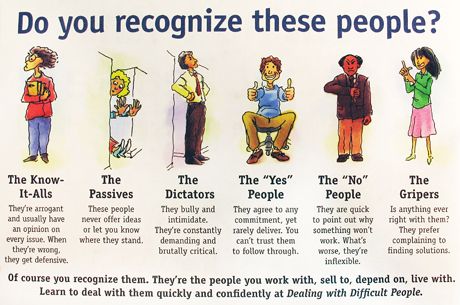Navigating Difficult and Controlling Coworkers: A Guide to Professional Survival
Working with difficult and controlling colleagues can transform even the most enjoyable job into a daily challenge. Whether it's a micromanaging peer, someone who takes credit for others' work, or a colleague who creates unnecessary drama, these workplace dynamics can significantly impact your productivity, job satisfaction, and mental well-being.
 Understanding Controlling Behavior
Understanding Controlling Behavior
Controlling coworkers often exhibit predictable patterns. They may insist on being involved in every decision, constantly check up on your work, dismiss your ideas without consideration, or attempt to redirect conversations and meetings to focus on their priorities. Some may use passive-aggressive tactics, while others are more openly domineering.
Understanding the root causes of this behavior can help you respond more strategically rather than emotionally. Many controlling colleagues are actually compensating for feelings of inadequacy—whether stemming from professional insecurity, lack of formal authority, or past experiences of being overlooked or dismissed. This overcompensation can manifest in various ways:
- Micromanaging to feel more in control
- Speaking louder or more frequently in meetings
- Taking credit for others' work to boost their perceived importance
- Creating unnecessary processes where they become the gatekeeper
- Dismissing others' ideas to position themselves as the expert
This compensatory behavior isn't limited to obvious insecurities. Common triggers in workplace settings include:
- Newer employees trying to establish credibility quickly
- People who feel their expertise isn't recognized
- Those passed over for promotions attempting to demonstrate leadership capabilities
- Individuals from underrepresented groups overcompensating to prove their worth
- People with imposter syndrome trying to project confidence
Recognizing these underlying motivations can help you approach difficult situations with both empathy and strategic thinking.
Setting Clear Boundaries
The foundation of dealing with controlling colleagues lies in establishing firm, professional boundaries. Be explicit about your role, responsibilities, and decision-making authority. When someone attempts to overstep, address it directly but diplomatically. For example, if a peer tries to assign you tasks outside your scope, you might say, "I appreciate your input, but this project falls under Sarah's purview. Let's loop her in." Document these interactions in writing when possible, especially if the behavior persists.
Communication Strategies That Work
Effective communication with difficult coworkers requires a blend of assertiveness and diplomacy. Use "I" statements to express your perspective without sounding accusatory. Instead of saying "You never listen to my ideas," try "I'd like to ensure my suggestions are fully considered before we make a decision." Keep conversations focused on work outcomes rather than personal conflicts. When dealing with interruptions or dismissive behavior, acknowledge their input while redirecting: "That's an interesting point, John. Let me finish explaining the data analysis, and then we can discuss both approaches."
Building Strategic Alliances
Don't face workplace bullies alone. Cultivate relationships with other team members, supervisors, and stakeholders who can provide support and perspective. These alliances serve multiple purposes: they offer emotional support, provide witnesses to problematic behavior, and can help amplify your voice when your ideas are dismissed or overshadowed. Strong professional relationships also make it harder for controlling colleagues to isolate or undermine you.
Documentation and Evidence
Maintain detailed records of interactions with difficult coworkers, especially those involving project decisions, deadlines, or conflicts. Save emails, take notes during meetings, and follow up verbal conversations with written summaries. This documentation protects you professionally and provides concrete examples if you need to escalate issues to management. Focus on facts rather than emotions in your records, noting specific behaviors, dates, and impacts on work productivity.
Managing Your Emotional Response
Dealing with controlling behavior can be emotionally draining. Recognize that you cannot change another person's behavior, only your response to it. Develop coping strategies such as taking deep breaths before responding to provocative comments, scheduling brief breaks after difficult interactions, or practicing mental reframing techniques. Consider the controlling behavior as a reflection of the other person's issues rather than a commentary on your abilities or worth.
When to Escalate
Sometimes direct resolution isn't possible, and escalation becomes necessary. Consider involving your supervisor or HR when the behavior significantly impacts your work quality, creates a hostile environment, or involves harassment or discrimination. Before escalating, ensure you have documented examples and have made reasonable attempts to address the situation directly. Present the issue as a business problem affecting productivity rather than a personality conflict.
Protecting Your Professional Reputation
Controlling colleagues sometimes attempt to undermine others to elevate themselves. Protect your reputation by consistently delivering quality work, meeting deadlines, and maintaining professional relationships throughout the organization. Share your accomplishments appropriately and ensure your contributions are visible to key stakeholders. If someone takes credit for your work, address it promptly and professionally, providing evidence of your contributions.
Knowing When to Move On
Sometimes the best solution is changing teams or finding a new position. If controlling behavior is tolerated or encouraged by management, if your mental health is suffering significantly, or if the situation prevents you from advancing professionally, it may be time to explore other options. This isn't admitting defeat—it's making a strategic career decision to place yourself in an environment where you can thrive.
Working with difficult and controlling coworkers is unfortunately common, but it doesn't have to derail your career or well-being. By setting clear boundaries, communicating effectively, building supportive relationships, and knowing when to escalate or move on, you can navigate these challenging dynamics while maintaining your professionalism and sanity. Remember that you have more control over these situations than you might initially realize, and with the right strategies, you can minimize their impact on your work life.
